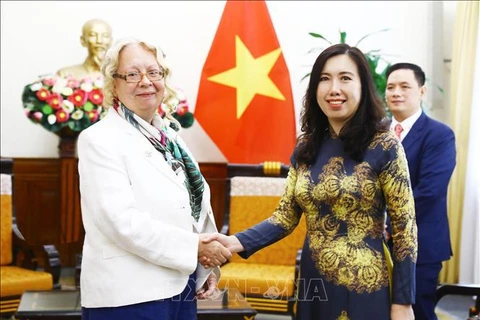 Studies found that reasons for migration include employment and education opportunities or family relations. (Photo: VNA)
Studies found that reasons for migration include employment and education opportunities or family relations. (Photo: VNA) Scholars and professionals from Vietnam, the Republic of Korea (RoK), Thailand and China gathered on October 24 at the Vietnam Women's Academy (VWA) in Hanoi to share their findings from migration studies, especially in regard to gender issues, health care and social protection.
Hosted by the VWA and the RoK’s Chonnam National University, the event aimed at solutions that mitigate the downside of migration and enhance migrants’ adaptation during the social integration process, thereby promoting gender equality and sustainable development.
In the opening remarks to the conference, the VWA President Dr Tran Quang Tien said that migration has been contributing to socio-economic development, balancing labour distributions and promoting international exchanges and technology transfer.
According to a 2022 report by the International Organisation for Migration (IOM), the number of international migrants has been on the rise for the past five decades.
As of 2020, the world counted approximately 281 million migrants, equivalent to 3.6% of the global population.
This figure is 128 million more than in 1990, and over three times the estimated number in 1970, said the report.
“Migration is also changing gender roles in the family, as migrant workers play an increasingly important role in the family’s livelihoods, financial and income improvements,” he added.
The shift in dividing household chores has been found to have positive impacts on the relationships among family members, said Dr Tien.
However, there are multiple issues that need more in-depth studies, such as social welfare, safety in labour and in the migration process, he noted.
According to a study on gender and migration by Dr Dang Nguyen Anh of the Vietnam Academy of Social Sciences, Vietnam placed second in Southeast Asia in terms of international migration.
With women accounting for 55.5% of domestic migrants and 52% of international migrants, the study also noted that there has also been a feminisation of migration which reflects the shift in gender norms and women’s roles.
The study pointed out that gender also affects the decision-making process of migrating, residing and even returning, yet this factor has not received adequate attention from migration studies.
Another study by Dr Truong Thuy Hang of the VWA pointed out that migration networks play an important role in social integration, both in the destination countries and when migrant workers decide to return to their homeland.
However, even with the increase in knowledge, skills and financial capacity, those who return might encounter challenges in life back home in terms of both employment and mental wellbeing.
Most migrants return to Vietnam still doing jobs that they previously worked at before migrating, unrelated to the skills and knowledge they acquired aboard, the study found.
This is due to a lack of equivalent employment, for example in high technology, for returning migrant workers in Vietnam, one of the district-level leaders in Hau Giang province participating in the study said.
Migrant workers who decided to return also face the stigma of “abandoning their families” from their local community.
A returned female migrant worker in Hai Phong city in the study also recommends that the local government have a way to provide mental support to returning migrant workers and their families.
“Local authorities should provide mental support as it is only with a happy spirit that they build a stable life. It’s hard to continue working if their mental well-being is not alright.”/.
VNA






















